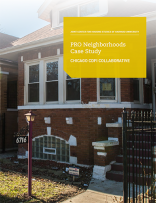PRO Neighborhoods Case Study: Chicago CDFI Collaborative
The Chicago CDFI Collaborative is a partnership of three community development financial institutions (CDFIs): Community Investment Corporation, Chicago Community Loan Fund, and Neighborhood Lending Services. In 2013 they were awarded $5 million through PRO Neighborhoods, a grant program of JPMorgan Chase & Co. that seeks to identify and support solutions to the problems of inequality and disadvantaged neighborhoods in the United States. The Chicago CDFI Collaborative aims to revive the most economically depressed low-income neighborhoods in the city of Chicago and its srategy is innovative in two significant ways:
- By targeting one-to-four-unit privately owned unsubsidized residential properties, which account for nearly half of the affordable rental stock in Chicago.
- By partnering with and assisting small-scale investors and owner-occupants, a group that up to now urban redevelopment programs have largely bypassed.
The Chicago CDFI Collaborative lent out nearly $25 million and helped to preserve 593 housing units in low-income communities during the period of its JPMorgan Chase award. In the process, the Chicago CDFI Collaborative acquired or financed the acquisition of 430 properties, with over half of its properties concentrated in eight low-income neighborhoods. Collaborations, this case study shows, have to adjust to conditions on the ground. In order to target its work in specific neighborhoods, the Chicago CDFI Collaborative developed a wide array of acquisition methods, including several local and federal government programs that dispose of foreclosed or troubled properties. The Chicago CDFI Collaborative identified and engaged small-scale investors, most of whom are minority entrepreneurs holding down full-time jobs and were not previously connected to any government or nonprofit revitalization programs. With the help of the Chicago CDFI Collaborative, these small-scale investors and owner-occupants poured over $24 million worth of renovations into one-to-four-unit buildings in disinvested areas. The Chicago CDFI Collaborative’s method of partnering with small-scale private investors to restore troubled one-to-four-unit properties is a promising strategy that could be applied in other post-industrial cities like Detroit, Cleveland, and St. Louis.

